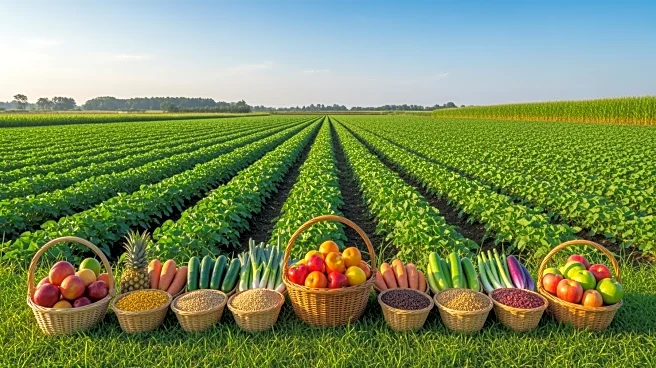What's Happening?
Indonesia's Agriculture Minister Andi Amran Sulaiman announced a significant downstreaming program in the food, plantation, and livestock sectors, which is expected to create up to 8 million jobs. The program, backed by an investment of Rp371 trillion
(US$22.2 billion), aims to enhance the value of local commodities through domestic processing. The initiative is part of a broader strategy to improve the welfare of farmers and increase the competitiveness of national commodities. Key commodities such as sugarcane, cocoa, and cashews are prioritized in this program. The government plans to absorb three million workers in the initial phase over the next three years, with a target of one million jobs per year. The program's success is exemplified by the coconut industry, where local processing has significantly increased the value of coconuts.
Why It's Important?
The downstreaming program is crucial for Indonesia's economic development, particularly in rural areas where agriculture is a primary source of income. By increasing the value of agricultural products through local processing, the program aims to boost farmers' incomes and reduce poverty. The creation of millions of jobs will also address unemployment and stimulate economic growth. Additionally, enhancing the competitiveness of Indonesian commodities on the global market can lead to increased exports and foreign exchange earnings. This initiative aligns with Indonesia's broader economic goals of industrialization and sustainable development.
What's Next?
The Indonesian government is expected to complete a pre-feasibility study soon, which will guide the next steps in the downstreaming program. The study will be submitted to Minister of Investment and Downstreaming Rosan Perkasa Roeslani for further action. As the program progresses, it will likely attract more investments and partnerships, both domestically and internationally. The government may also introduce policies to support the program, such as incentives for local processing industries and infrastructure development. Stakeholders, including farmers, investors, and policymakers, will closely monitor the program's implementation and outcomes.
Beyond the Headlines
The downstreaming program could have broader implications for Indonesia's agricultural sector, including shifts in land use and farming practices. As local processing becomes more prevalent, there may be increased demand for certain crops, leading to changes in agricultural production patterns. The program also raises questions about environmental sustainability, as increased processing activities could impact natural resources and ecosystems. Ensuring that the program aligns with environmental goals will be crucial for its long-term success.
















